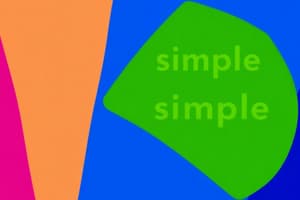Podcast
Questions and Answers
How are questions in the past simple tense typically formed?
How are questions in the past simple tense typically formed?
- By using the verb in its base form
- By using the verb in its future form
- By using the verb in its present form
- By using the verb in its past form (correct)
What is the typical word order in a question in the past simple tense?
What is the typical word order in a question in the past simple tense?
- Verb and subject together
- Verb before subject
- Subject before verb (correct)
- Subject and verb in random order
What type of action is described by the simple aspect of the past simple tense?
What type of action is described by the simple aspect of the past simple tense?
- Actions that started in the past
- Habitual actions
- Completed actions (correct)
- Ongoing actions
What is the purpose of the perfect aspect of the past simple tense?
What is the purpose of the perfect aspect of the past simple tense?
What is the purpose of the perfect continuous aspect of the past simple tense?
What is the purpose of the perfect continuous aspect of the past simple tense?
How many aspects does the past simple tense have?
How many aspects does the past simple tense have?
Which auxiliary verb is used to form negative sentences in the past simple tense?
Which auxiliary verb is used to form negative sentences in the past simple tense?
What is added to the main verb to form a negative sentence in the past simple tense?
What is added to the main verb to form a negative sentence in the past simple tense?
In negative sentences in the past simple tense, what is placed after the main verb's past participle form?
In negative sentences in the past simple tense, what is placed after the main verb's past participle form?
How do you make a negative interrogative sentence in the past simple tense?
How do you make a negative interrogative sentence in the past simple tense?
What does the negative form of the past simple tense express?
What does the negative form of the past simple tense express?
In which part of the sentence is the subject placed in negative interrogative sentences in the past simple tense?
In which part of the sentence is the subject placed in negative interrogative sentences in the past simple tense?
Flashcards are hidden until you start studying
Study Notes
The past simple tense in English is formed by adding 'ed' to the verb's base form. It is used to describe an action that occurred in the past and is now completed. Questions in the past simple tense are formed by using the question word and the verb in its past form. For example, "What did you do yesterday?" or "Did you finish your homework?"
In the past simple tense, the verb form is used to describe a completed action in the past. This tense is often used when talking about events that happened in the past, such as "I ate breakfast at 7 am yesterday." It can also be used to describe a habitual or repeated action that occurred regularly in the past, such as "I used to go to London every Christmas."
The past simple tense has four aspects: simple, continuous, perfect, and perfect continuous. The simple aspect is used for completed actions, the continuous aspect is used for ongoing actions in the past, the perfect aspect is used for actions that started in the past but have some connection to the present, and the perfect continuous aspect is used to show that an action has been in progress since a specific point in time.
To form questions in the past simple tense, the subject is typically found before the verb, and the verb is in its past form. For example, "What did you do yesterday?" or "Did you finish your homework?"
Studying That Suits You
Use AI to generate personalized quizzes and flashcards to suit your learning preferences.




